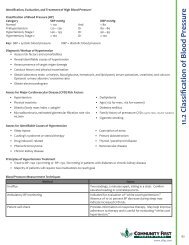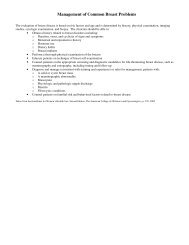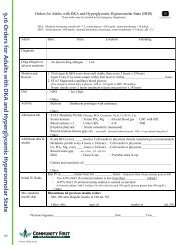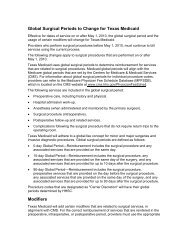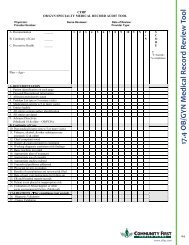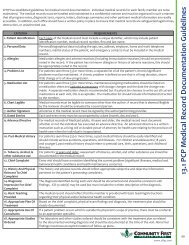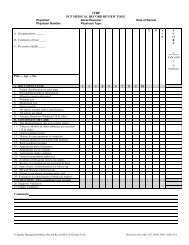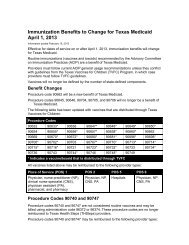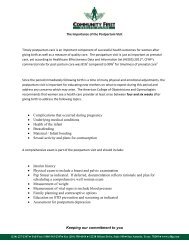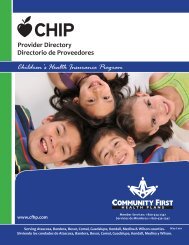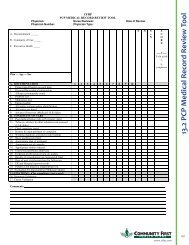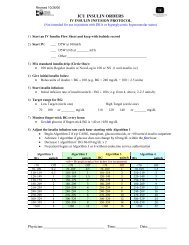Full Clinical Guidelines - Community First Health Plans.
Full Clinical Guidelines - Community First Health Plans.
Full Clinical Guidelines - Community First Health Plans.
You also want an ePaper? Increase the reach of your titles
YUMPU automatically turns print PDFs into web optimized ePapers that Google loves.
EXAMINATION / TESTS<br />
4. Follow-up Lab<br />
Triple screen<br />
Glucose Challenge test/H & H/Ab screen<br />
H & H/VDRL/Group B Strep<br />
5. Postpartum Care<br />
Interim history and physical exam<br />
Evaluation of weight<br />
Vital signs<br />
Cervical cytology (as needed)<br />
Family planning / contraceptive practices<br />
STD prevention<br />
Assessment for postpartum depression<br />
At 8-20 weeks gestation<br />
At 24-28 weeks gestation<br />
At 35-37 weeks gestation<br />
4-6 weeks after delivery<br />
SCHEDULE<br />
*optional<br />
Management of pregnancy requires establishing an estimated date of delivery. Problems such as intrauterine growth<br />
restriction, preterm labor, and postterm pregnancy are managed most effectively when an accurate estimated date of delivery<br />
is known. In addition, accurate gestational dating is important for the application and interpretation of certain antepartum<br />
tests (ie, maternal serum alpha-fetoprotein or assessment of fetal maturity). If there is a size-date discrepancy or if menstrual<br />
dates are uncer¬tain, an ultrasound examination is indicated for the purpose of dating. Such an examination is most accurate<br />
when performed before 20 weeks of gestation. Ultrasound results are considered to be consistent with menstrual dates if<br />
there is gestational age agreement to within 3 days by crown-rump length (CRL) measurement obtained at 6-10 weeks of<br />
gestation, within 5 days by CRL measurement obtained at 10-14 weeks of gestation, or within 7 days by the average of multiple<br />
measurements obtained at 14-20 weeks of gestation.<br />
Identification of risk factors is critical in order to minimize maternal and neonatal morbidity and mortality. In some instances,<br />
obstetric problems require a multidis¬ciplinary approach to antepartum care. Some conditions may require the involvement<br />
of a maternal-fetal medicine (MFM) subspecialist, geneticist, pediatrician, neonatologist, anesthesiologist, or other medical<br />
special¬ist in the evaluation, counseling, and care of the patient. <strong>Community</strong> <strong>First</strong> <strong>Health</strong> <strong>Plans</strong> actively outreaches to all<br />
identified program members to assess risk status and to assist both member and provider with managing risk factors once<br />
identified. Much of our program is based on member education surrounding how to identify risk factors associated with<br />
pregnancy. If you have a member who would benefit from this program, please make a referral by contacting CFHP.<br />
Approximately 4 – 6 weeks after delivery, the mother should visit her physician for a postpartum review and examination. The<br />
follow-up appointment interval may be modified according to the needs of the patient. A visit within 7-14 days of delivery may<br />
be advisable after a cesarean delivery or a complicated gestation.<br />
144 H EALTH PLANS<br />
www.cfhp.com



